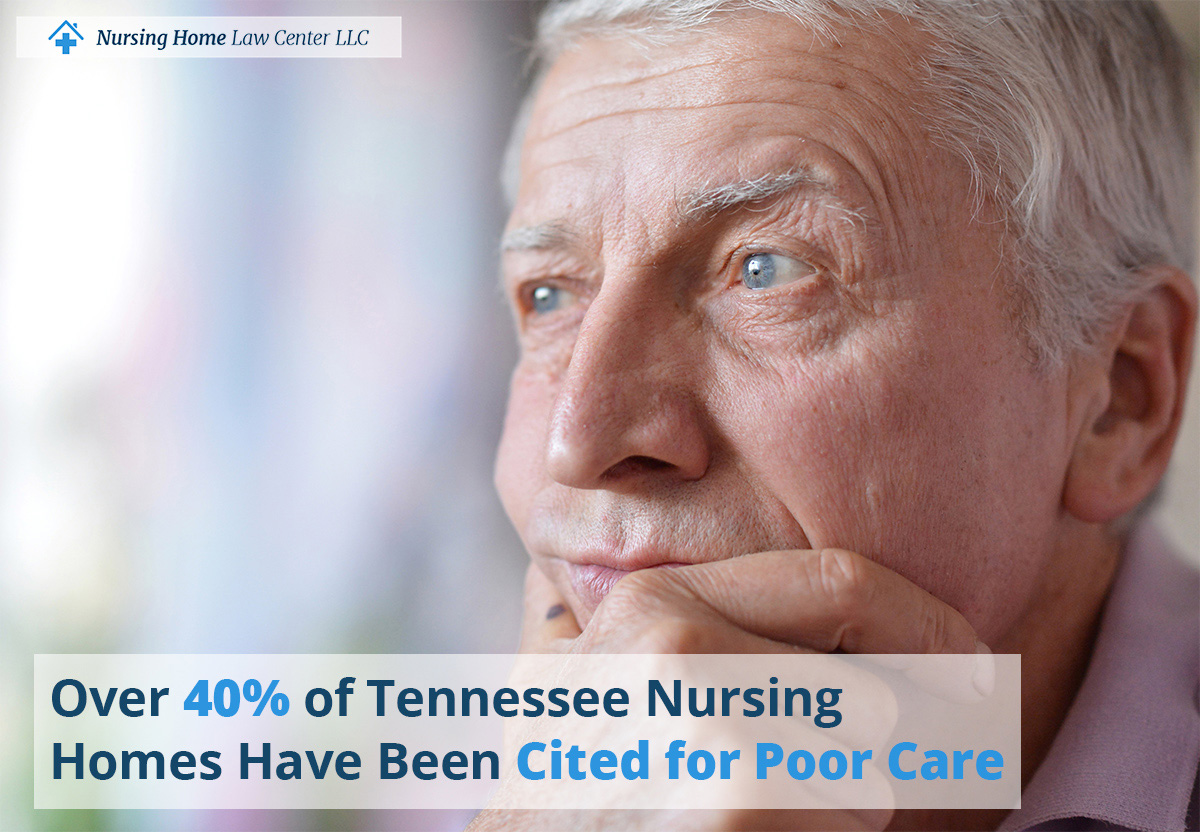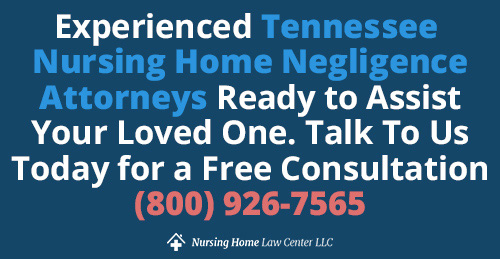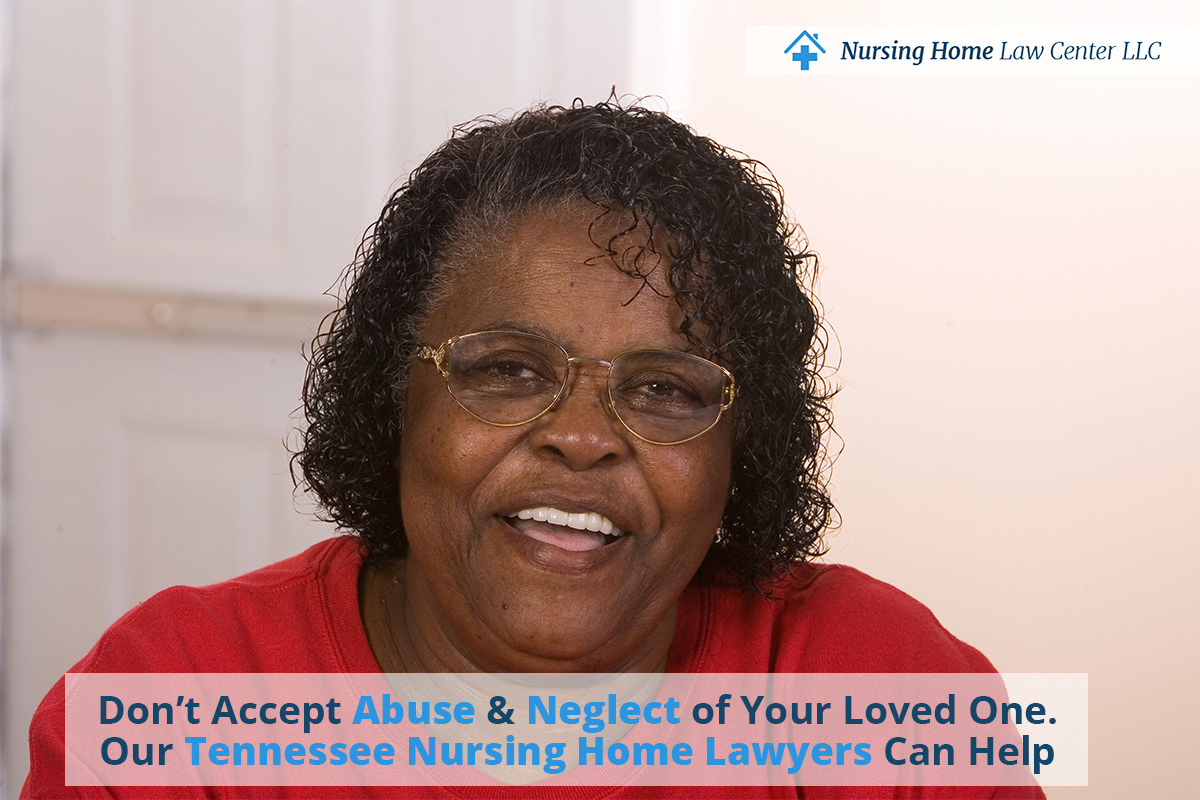legal resources necessary to hold negligent facilities accountable.
Tennessee Nursing Home Abuse Lawyer
Nursing home abuse represents a grave concern in our society, affecting some of the most vulnerable individuals. The impacts of this abuse, ranging from physical injuries to psychological trauma, can be devastating.
Nursing Home Law Center, LLC is at the forefront of battling this injustice. Each Tennessee nursing home abuse lawyer provides effective representation, aiming to secure financial compensation for victims and drive systemic change in elder care standards.
 Advocating for the Rights and Safety of Seniors
Advocating for the Rights and Safety of SeniorsIn Tennessee, advocating for the rights and safety of seniors, particularly those in nursing homes, is of utmost importance. Our role as Tennessee nursing home abuse lawyers centers on ensuring that the vulnerable elderly population is safeguarded against any form of nursing home neglect or abuse. These efforts are not only about legal representation but also about promoting a culture of respect and care for the aging members of our community.
The commitment to protect seniors extends beyond individual legal cases. It involves working towards systemic changes that elevate the standard of care in nursing care facilities. This commitment is underscored by our understanding of the unique needs and challenges elderly persons face, who often cannot advocate for themselves. By championing their rights, each nursing home abuse attorney strives to create an environment where dignity, respect, and proper care are the norms, not the exceptions.
Our legal team, experienced in handling nursing home abuse cases, is dedicated to fighting for the rights of seniors. Our approach is holistic, considering the emotional, physical, and legal aspects of each case, ensuring that the elder abuse victims and their families receive comprehensive support and representation.
 Understanding the Gravity of Nursing Home Negligence and Abuse in Tennessee
Understanding the Gravity of Nursing Home Negligence and Abuse in TennesseeNursing home abuse in Tennessee represents a significant and troubling issue. It encompasses a range of harmful behaviors, from physical abuse and emotional distress to financial exploitation. These actions violate the rights of nursing home patients and undermine the fundamental trust placed in these care facilities.
The increasing reports of nursing home neglect and abuse within Tennessee paint a concerning picture. These incidents, unfortunately, often go unnoticed or unreported, leaving many vulnerable seniors to suffer in silence. Recognizing and proactively addressing these issues is crucial to protecting our elders from further harm and upholding the care they rightfully deserve.
Increasing Cases of Abuse and Neglect in Nursing HomesThe rise in cases of neglect and abuse in nursing homes is a disturbing trend. These cases range from instances of physical abuse, like hitting or improper use of physical restraints, to more subtle forms of neglect and emotional abuse. Each case represents a serious breach of the duty of care owed to nursing home patients.
Instances of nursing home negligence often manifest as a lack of primary care, leading to bed sores, malnutrition, or unattended medical needs. This neglect can stem from understaffing, inadequate training, or a simple disregard for the well-being of patients. Identifying and addressing these issues is critical in preventing further harm to our seniors.
The emotional impact of nursing home abuse and neglect on patients and their family members cannot be overstated. It often leads to a decline in the overall health and quality of life of the elderly, exacerbating existing health conditions and leading to a sense of helplessness and despair.
 Nursing Homes Rated Poorly in Tennessee
Nursing Homes Rated Poorly in TennesseeThe poor ratings of many Tennessee nursing homes are a cause for concern, reflecting widespread issues in the standard of care. These ratings, often based on various health and safety metrics, paint a grim picture of the living conditions many elderly patients are subjected to. It is a situation that demands not only awareness but active intervention.
Poor ratings of nursing facilities in Tennessee are indicative of deeper systemic problems. These include inadequate training and a lack of resources, all of which contribute to the neglect and abuse of patients. As Tennessee nursing home abuse lawyers, our legal team scrutinizes these ratings to identify patterns of neglect and pursue legal action against facilities that fail to meet the required standards of care.
Alarming Nursing Home Statistics in TennesseeAs of December 2023, Tennessee faces a significant challenge in ensuring the well-being and safety of its nursing home residents. Startling statistics from the Centers for Medicare and Medicaid Services (CMS) reveal that 155 out of the 302 nursing homes in the state, comprising a concerning 50%, are rated as "below average" or "much below average."
These figures shed light on the urgent need to comprehensively address issues within Tennessee's care facilities. Among the nursing homes in Tennessee, inspectors have cited several instances of abuse. These citations holding the responsible party accountable were at the following localities:
- Agape Rehabilitation & Nursing Center
- AHC Forest Cove
- AHC Lewis County
- Beverly Park Place Health and Rehab
- Church Hill Post-Acute and Rehabilitation Center
- Copper Basin Health & Rehabilitation
- Cumberland Village Care
- Fairpark Health and Rehabilitation
- Gallaway Health and Rehab
- Graceland Rehabilitation and Nursing Care Center
- Greystone Health Care Center
- Hardin County Nursing Home
- Midtown Center for Health and Rehabilitation
- Millington Healthcare Center
- NHC Healthcare Knoxville
- Orchard View Post-Acute and Rehabilitation Center
- Quince Nursing and Rehabilitation Center
- Ripley Healthcare and Rehab Center
- Shannondale Health Care Center
- Signature Healthcare of Monteagle Rehab & Wellness
- Spring City Care and Rehabilitation Center
- Summit View of Rocky Top
- Tri-State Health and Rehabilitation Center
- Viviant Healthcare of Bristol
- Viviant Healthcare of Murfreesboro
- Westmoreland Health and Rehabilitation Center
- Wyndridge Health and Rehab Center
These statistics underscore the pressing need for action and reform to protect the vulnerable patients of Tennessee's nursing homes.
Investigating Nursing Home Ratings and ViolationsInvestigating the ratings and violations of nursing homes in Tennessee is a crucial part of working as a nursing home abuse attorney. Through tools like Medicare's Care Compare, we can identify facilities that consistently fail to meet health and safety standards, often leading to abuse, mistreatment, and neglect cases.
These ratings, based on various criteria from health inspections to staffing levels, provide a snapshot of the quality of care. They are an essential tool in our legal arsenal, allowing our personal injury lawyers to pinpoint facilities that may subject patients to substandard care.
 Identifying Signs of Nursing Facility Abuse
Identifying Signs of Nursing Facility AbuseIdentifying signs of nursing home abuse is a crucial step in protecting the elderly from harm. These signs can be varied and may not always be immediately apparent. As experienced Tennessee nursing home abuse lawyers, we understand the importance of recognizing these indicators to take timely action.
Recognizing Red FlagsRecognizing the red flags of nursing home abuse involves being vigilant about the physical and emotional condition of the residents. Telltale signs can include unexplained injuries, sudden weight loss, or changes in behavior. Other indicators, like unsanitary living conditions or lack of proper medical care, can point to neglect.
Families and friends of nursing home residents should be aware of these signs and understand that they can be indicators of more serious underlying issues. Regular visits, open communication with nursing staff, and a keen eye for any changes in the resident's condition can assist with identifying these red flags early. Our law firm helps families recognize and understand these signs, guiding them on the steps to take if they suspect abusive behavior or negligence.
Physical, Negligence, and Psychological IndicatorsUnderstanding the indicators is critical in identifying and addressing the different types of abuse effectively:
- Pressure Ulcers (Bed Sores): Facility-acquired pressure sores often reveal negligence, indicating a lack of movement or proper care.
- Broken Bones: Can suggest falls or rough handling by nursing home staff.
- Emotional Withdrawal may be indicative of psychological/mental abuse, depression, high anxiety, and sexual abuse.
- Changes in Appetite or Sleep Patterns Can signal emotional distress or health issues.
- Unsanitary Conditions: Living in filth in nursing facilities can worsen a patient's health and medical condition.
 Types of Nursing Home Negligence and Abuse in Tennessee
Types of Nursing Home Negligence and Abuse in TennesseeOur role as nursing home abuse lawyers involves not only representing victims but also educating families about the different types of abuse that can occur in these settings.
Physical and Psychological AbusePhysical and psychological abuse in nursing homes are among the most common and devastating forms of mistreatment. Physical mistreatment includes any form of bodily harm, ranging from hitting and restraining to more subtle forms of mistreatment like forced feeding or medication. Psychological abuse, on the other hand, can be more insidious, involving:
- Verbal assaults
- Threats
- Emotional manipulation
The signs of physical and emotional abuse in nursing homes are often visible but can also be hidden. Unexplained injuries, sudden changes in behavior, or fearfulness are clear indicators of potential abuse. Addressing physical and psychological abuse in nursing homes is a top priority. Our legal professionals work tirelessly to bring these cases to light, offering a voice to those who might otherwise suffer in silence.
Financial Exploitation and Medical MalpracticeFinancial exploitation and medical malpractice are other prevalent forms of abuse in nursing homes. Financial abuse involves the unauthorized or improper use of a resident's funds, property, or assets. Medical negligence pertains to nursing home negligence or incompetence in providing medical care, often leading to worsening health conditions or preventable injuries.
Recognizing the Various Forms of Abuse and NeglectRecognizing the various forms of abusive behavior and negligence in nursing care facilities is crucial for prevention and intervention. Our role extends beyond legal representation; we aim to educate families and the medical community on the common signs of abuse, empowering them to act swiftly should they suspect mistreatment.
- Physical Abuse: Signs include unexplained bruises, broken bones and fear of physical contact.
- Emotional Abuse: Symptoms may manifest as withdrawal, depression, or sudden changes in behavior.
- Sexual Abuse: Indicators can be physical injuries around private areas, STDs, or sudden fearfulness.
- Financial Abuse: Unusual financial transactions, missing valuables, or sudden changes in financial status.
- Negligence: Poor hygiene, malnutrition, untreated medical conditions, medication errors, and unsafe living conditions.
The legal framework provides a foundation for protecting Tennessee nursing home patients. Understanding these laws is crucial in advocating effectively for mistreated and abused victims. Our firm is well-versed in the state and federal regulations governing nursing care facilities, ensuring our legal strategies are robust and effective.
State and Federal Laws Safeguarding the ElderlyState and federal laws are critical in safeguarding the elderly in nursing care facilities. The Adult Protection Act and the Nursing Home Reform Act of 1987 are critical pieces of legislation outlining the standards for elder care and patient rights. Federal regulations and Tennessee law provide a legal basis for holding nursing homes and long-term care facilities accountable for abuse, mistreatment, and neglect.
Understanding these laws is essential in our work as nursing home abuse lawyers. They guide our legal strategies and inform our approach to each case. We leverage these laws, ensuring nursing facilities adhere to the highest standards of care and that any violations are met with many legal options.
Nursing Home Resident RightsThe rights of nursing patients are enshrined in Tennessee law and must be respected and protected. Violations of these rights are unethical and grounds for legal action. These rights encompass various aspects of their daily lives and care and include:
- The right to be treated with dignity and respect
- The right to receive appropriate medical care
- The right to be free from abuse and negligence
- The right to privacy
- Freedom from physical restraints
Educating residents and their families about their legal rights is critical to our work. By doing so, we empower them to be proactive in their care, recognize signs of abuse or neglect, and understand their legal options. Our firm is committed to fostering an environment where the dignity and rights of every elderly person in a nursing home are upheld.
Reporting and Addressing Tennessee Nursing Facility AbuseAddressing and reporting elder abuse is a critical component in safeguarding the rights and well-being of the elderly. It's imperative that any suspicion of abuse is taken seriously and acted upon promptly.
Documenting Evidence of AbuseDocumenting potential evidence of abuse or neglect is essential for building a solid legal case. This includes taking notes of any suspicious injuries, behavioral changes, or environmental conditions. Photographs, medical records, and witness statements can serve as crucial pieces of evidence.
Documenting evidence is not just for legal purposes; it records the care and treatment received in the nursing home. This documentation can be used to advocate for improved care standards and to hold negligent facilities and nursing staff accountable for their actions.
How and Where to Report AbuseKnowing how and where to report caregiver abuse in Tennessee is crucial for ensuring that appropriate action is taken. Reports can be made to the following agencies and authorities:
- Local authorities: Contact your local law enforcement agency or police department at 911 to report instances of abuse or neglect in nursing homes.
- Tennessee Department of Health: The state health department is vital in monitoring and regulating healthcare facilities, including nursing homes. You can report abuse or concerns about the quality of care to the Tennessee Department of Health.
- Tennessee Long-Term Care Ombudsman Program: The Ombudsman program is dedicated to advocating for the rights and well-being of residents in long-term care facilities, including nursing homes. They can assist in addressing complaints of neglect and serious injury and ensuring proper investigations.
- Tennessee Department of Human Services: The Department of Human Services may also be involved in cases involving vulnerable adults and can provide support and resources in cases of abuse or neglect.
Timely reporting is essential, as it helps protect the resident and prevents further abuse. Our law firm specializes in assisting families in navigating the reporting process. We guide you through the appropriate channels to report neglect and abuse, ensuring that reports are made to maximize their impact. We aim for each nursing home abuse attorney to address individual cases and contribute to a safer environment for all residents.
According to the US Department of Human Services, timely reporting is essential for protecting the resident and preventing further abuse.
Our law firm assists families in navigating the reporting process. We guide the appropriate channels to report abusive behavior and ensure that reports are made to maximize their impact. It's our goal for each nursing home abuse attorney to address individual cases and contribute to a safer environment for all nursing residents.
The Role of Tennessee Ombudsman in Elder Abuse CasesThe Tennessee Ombudsman program is pivotal in addressing nursing home neglect and abuse concerns. The Ombudsman advocates for nursing residents, investigating complaints and working to resolve issues related to care and treatment. Their involvement can be crucial in addressing instances of abuse or neglect.
Our law firm often collaborates with the Tennessee Ombudsman to address concerns related to elder abuse. We recognize the importance of their role in providing an additional layer of protection for elderly residents. Their investigations and findings can be instrumental in building a solid legal Tennessee nursing home abuse case against abusive or negligent nursing care homes.
The Ombudsman's work is integral to ensuring that the rights and well-being of nursing residents are protected. They serve as an essential resource for families and residents, offering guidance and support in navigating the complexities of nursing home care.
Legal Recourse for Tennessee Nursing Home Neglect and Abuse VictimsLegal recourse is available for Tennessee nursing home abuse victims. Pursuing legal opportunities is not just about seeking compensation; it's about holding responsible parties accountable and preventing future abuse.
Importance of Filing an Elder Abuse LawsuitFiling a Tennessee nursing home abuse case is a critical step in obtaining justice for victims and their families. It serves as a deterrent to nursing homes, signaling that abuse and neglect will not be tolerated. Legal actions also bring proper attention to the issue, contributing to broader efforts to improve elder care.
The decision to file a lawsuit is significant, and our Tennessee nursing home abuse lawyer legal group is dedicated to guiding families through this process. We understand the emotional and legal complexities and strive to smooth the process. We aim to ensure that nursing home victims receive the justice and compensation they deserve while contributing to a larger movement for change.
Nursing Home Wrongful DeathThe tragic reality is that mistreatment or neglect within nursing homes can sometimes lead to wrongful death. When a loved one's life is lost due to abuse, neglect, or medical negligence by the nursing home staff or other residents, it's a devastating event for the family. Wrongful death in these circumstances is a profound tragedy, highlighting the critical need for accountability and justice.
Securing Financial CompensationIn such heartbreaking situations, a skilled nursing home abuse lawyer can play a pivotal role in securing compensation for the family. This compensation is essential for covering not only the costs associated with the preventable death but also the medical expenses incurred before the victim's passing.
A nursing home abuse lawyer can advocate for the family's rights and pursue justice on their behalf. They work diligently to hold those responsible accountable for their actions or negligence, ensuring that the family receives the financial support they need. Monetary compensation can assist with covering medical expenses, funeral bills, and other costs related to the loss of a beloved family member, offering some measure of relief to the grieving family.
Tennessee Nursing Home Abuse Lawyers Restoring Dignity After Abuse or NeglectThe impact of abuse or neglect on an abused nursing home victim and their family can last a lifetime. Our Nursing Home Law Center, LLC team is here to provide support and legal counsel at no upfront cost, thanks to our contingency fee agreement. Contact our Tennessee nursing facility abuse lawyer at (800) 926-7565 for a free consultation to reclaim your loved one's dignity and rights.
 Tennessee Nursing Home Injury Attorney Nursing Home Law Center LLC Home
Tennessee Nursing Home Injury Attorney Nursing Home Law Center LLC Home

